冬奥会知识普及 英语课件
- 格式:ppt
- 大小:1.64 MB
- 文档页数:17
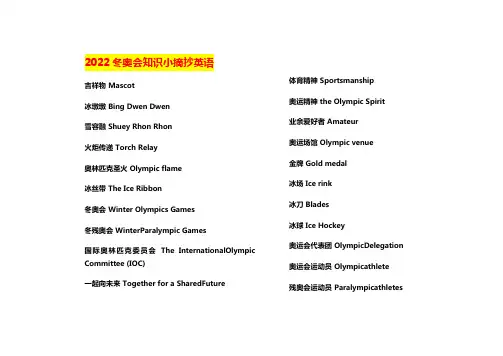
2022冬奥会知识小摘抄英语吉祥物 Mascot冰墩墩 Bing Dwen Dwen雪容融 Shuey Rhon Rhon火炬传递 Torch Relay奥林匹克圣火 Olympic flame冰丝带 The Ice Ribbon冬奥会 Winter Olympics Games冬残奥会 WinterParalympic Games国际奥林匹克委员会The InternationalOlympic Committee (IOC)一起向未来 Together for a SharedFuture 体育精神 Sportsmanship奥运精神 the Olympic Spirit业余爱好者 Amateur奥运场馆 Olympic venue金牌 Gold medal冰场 Ice rink冰刀 Blades冰球 Ice Hockey奥运会代表团 OlympicDelegation 奥运会运动员 Olympicathlete残奥会运动员 Paralympicathletes火炬点燃仪式 TorchLighting Ceremony主办国 Host Country主办城市 Host City奥运村 The Olympic Village开幕式 OpeningCeremony闭幕式 ClosingCeremony7个大项下面的15个分项,可以分为冰上运动和雪上运动两大类:冰上项目:短道速滑 short-track speed skating速度滑冰 speed skating花样滑冰 figure skating 冰球 ice hockey冰壶 curling雪上项目:雪车 bobsleigh钢架雪车 skeleton雪橇 luge冬季两项 biathlon高山滑雪 alpine skiing自由式滑雪 freestyle skiing 单板滑雪 snowboarding跳台滑雪 ski jumping越野滑雪 cross-country skiing。
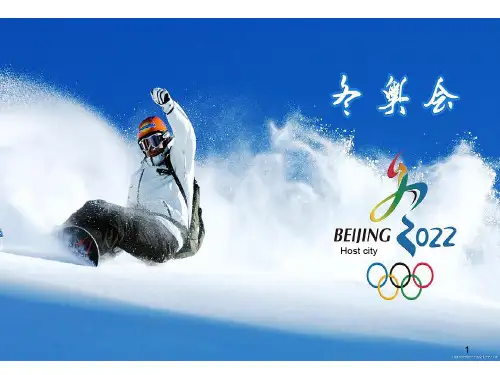

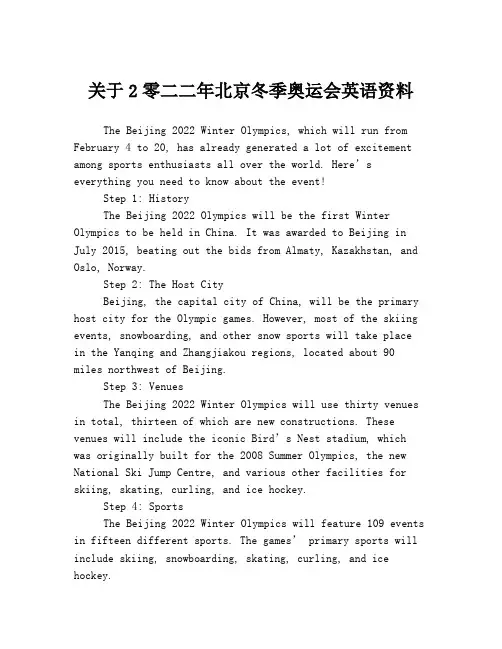
关于2零二二年北京冬季奥运会英语资料The Beijing 2022 Winter Olympics, which will run from February 4 to 20, has already generated a lot of excitement among sports enthusiasts all over the world. Here’s everything you need to know about the event!Step 1: HistoryThe Beijing 2022 Olympics will be the first Winter Olympics to be held in China. It was awarded to Beijing in July 2015, beating out the bids from Almaty, Kazakhstan, and Oslo, Norway.Step 2: The Host CityBeijing, the capital city of China, will be the primary host city for the Olympic games. However, most of the skiing events, snowboarding, and other snow sports will take placein the Yanqing and Zhangjiakou regions, located about 90 miles northwest of Beijing.Step 3: VenuesThe Beijing 2022 Winter Olympics will use thirty venues in total, thirteen of which are new constructions. These venues will include the iconic Bird’s Nest stadium, which was originally built for the 2008 Summer Olympics, the new National Ski Jump Centre, and various other facilities for skiing, skating, curling, and ice hockey.Step 4: SportsThe Beijing 2022 Winter Olympics will feature 109 events in fifteen different sports. The games’ primary sports will include skiing, snowboarding, skating, curling, and ice hockey.Step 5: SustainabilityOne of the main goals of the Beijing 2022 Winter Olympics is sustainability. The venue design and construction have incorporated green technologies, including solar and wind energy, to reduce carbon emissions. The organizers hope the event will set an example of how an Olympic event can be both extravagant and environmentally responsible.Step 6: Coronavirus MeasuresDue to the ongoing COVID-19 pandemic, the Beijing 2022 Winter Olympics will have some measures in place to ensure the safety of the athletes and attendees. These measures will include mandatory vaccination for all participants, a reduced number of in-person attendees, and regular testing for the virus.Step 7: Media CoverageThe Beijing 2022 Winter Olympics will be broadcasted globally, with several international media outlets acquiring the rights to report from the event. NBCUniversal will be the exclusive media partner of the games in the United States, while other countries will have their own networks covering the event.In conclusion, the Beijing 2022 Winter Olympics will be an extraordinary event held in China and will showcase the country's culture and history. It's sure to be an exciting time for both the athletes and the spectators to witness history being made on the snow and ice.。
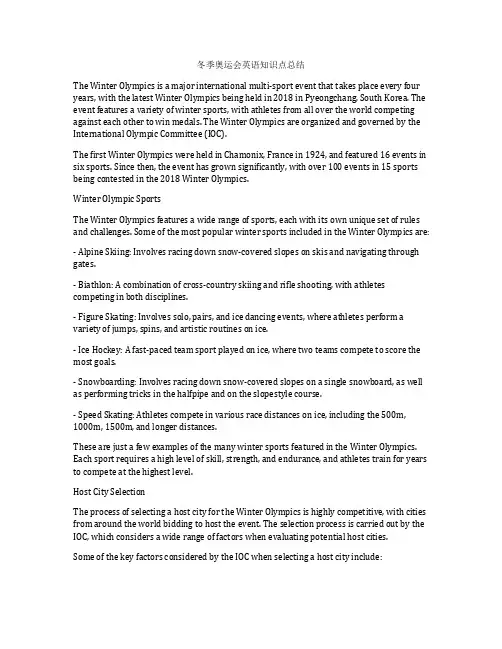
冬季奥运会英语知识点总结The Winter Olympics is a major international multi-sport event that takes place every four years, with the latest Winter Olympics being held in 2018 in Pyeongchang, South Korea. The event features a variety of winter sports, with athletes from all over the world competing against each other to win medals. The Winter Olympics are organized and governed by the International Olympic Committee (IOC).The first Winter Olympics were held in Chamonix, France in 1924, and featured 16 events in six sports. Since then, the event has grown significantly, with over 100 events in 15 sports being contested in the 2018 Winter Olympics.Winter Olympic SportsThe Winter Olympics features a wide range of sports, each with its own unique set of rules and challenges. Some of the most popular winter sports included in the Winter Olympics are:- Alpine Skiing: Involves racing down snow-covered slopes on skis and navigating through gates.- Biathlon: A combination of cross-country skiing and rifle shooting, with athletes competing in both disciplines.- Figure Skating: Involves solo, pairs, and ice dancing events, where athletes perform a variety of jumps, spins, and artistic routines on ice.- Ice Hockey: A fast-paced team sport played on ice, where two teams compete to score the most goals.- Snowboarding: Involves racing down snow-covered slopes on a single snowboard, as well as performing tricks in the halfpipe and on the slopestyle course.- Speed Skating: Athletes compete in various race distances on ice, including the 500m, 1000m, 1500m, and longer distances.These are just a few examples of the many winter sports featured in the Winter Olympics. Each sport requires a high level of skill, strength, and endurance, and athletes train for years to compete at the highest level.Host City SelectionThe process of selecting a host city for the Winter Olympics is highly competitive, with cities from around the world bidding to host the event. The selection process is carried out by the IOC, which considers a wide range of factors when evaluating potential host cities.Some of the key factors considered by the IOC when selecting a host city include:- Infrastructure: The host city must have the necessary infrastructure in place to accommodate thousands of athletes, coaches, and spectators, as well as to host the various sporting events.- Venues: The host city must have suitable venues for the different winter sports, including ski slopes, ice rinks, and biathlon shooting ranges.- Transportation: The host city must have a reliable transportation system in place to move athletes and spectators between venues and accommodation.- Legacy: The IOC looks for host cities that can leave a positive long-term legacy after the Winter Olympics, such as improved infrastructure and sporting facilities.- Financial Stability: The host city must have the financial means to host the event and ensure its success.The selection process typically takes place several years before the Winter Olympics, with cities submitting formal bids and undergoing a rigorous evaluation process. The winning city is announced at an IOC session, with the next host city announced after each Winter Olympics.Winter Olympics Opening CeremonyThe Winter Olympics opening ceremony is a spectacular event that marks the official start of the games. It typically takes place in a large stadium and is attended by thousands of athletes, officials, and spectators from around the world.The opening ceremony often features a combination of music, dance, and cultural performances, as well as the official parade of athletes. During the parade, athletes from each country march into the stadium carrying their national flag, wearing their country's colors.The highlight of the opening ceremony is the lighting of the Olympic flame, which symbolizes the spirit of the games. The flame is carried into the stadium by a series of torchbearers, with the final torchbearer lighting the cauldron to officially start the games.The opening ceremony is a celebration of the diversity of the competing nations and the shared spirit of sportsmanship and competition. It is also an opportunity for the host city to showcase its culture and heritage to a global audience.Winter Olympics Closing CeremonyThe Winter Olympics closing ceremony is held at the end of the games and serves as a symbolic conclusion to the event. It is a more relaxed and celebratory affair, with athletes and officials coming together to reflect on their experiences and bid farewell to the host city. The closing ceremony often includes a variety of musical and cultural performances, as well as the official handover of the Olympic flag to the next host city. This ceremony marks thetransition from the current Winter Olympics to the next one, and provides an opportunity for the next host city to showcase its culture and heritage.As with the opening ceremony, the closing ceremony is attended by thousands of athletes, officials, and spectators, and is a chance for the host city to celebrate the success of the event and thank all those involved.Winter Olympics Medal TableDuring the Winter Olympics, athletes from around the world compete in a wide range of sports to win medals for their respective countries. At the end of the games, a medal table is compiled to rank the participating countries based on the number of gold, silver, and bronze medals they have won.The medal table is a source of national pride and competition, and is closely followed by fans and media around the world. It provides a clear indication of which countries have performed the best in the Winter Olympics and serves as a measure of sporting success.The United States, Norway, and Germany have traditionally been strong performers at the Winter Olympics, consistently winning a large number of medals across a variety of sports. However, many other countries have also achieved success in specific sports, such as Canada in ice hockey, and Russia in figure skating.Hosting the Winter Olympics can also impact a country's performance in the medal table, with host nations often receiving a boost in medal count due to home advantage and increased resources.Winter Olympics Doping ScandalsDoping scandals have been a recurring issue in the Olympics, with several high-profile cases occurring during the Winter Olympics. Doping refers to the use of banned substances or methods to enhance athletic performance, and is strictly prohibited by the IOC.One of the most infamous doping scandals in Winter Olympics history occurred during the 2014 Sochi Winter Olympics, where Russian athletes were found to have engaged in a state-sponsored doping program. This scandal resulted in numerous Russian athletes being banned from competing and the country being stripped of multiple medals.Doping scandals have damaged the reputation of the Winter Olympics and raised questions about the effectiveness of anti-doping measures. The IOC and other sporting bodies have taken steps to increase the frequency and rigor of drug testing, as well as to impose stricter penalties on athletes and countries found to have violated anti-doping rules.The Winter Olympics and LGBT RightsThe Winter Olympics have been the subject of controversy regarding LGBT rights, particularly in relation to the host country's treatment of LGBT individuals. Several hostcountries have faced criticism for their anti-LGBT laws and policies, leading to calls for boycotts and protests.One of the most notable cases was the 2014 Sochi Winter Olympics in Russia, where the country's strict anti-LGBT laws and hostile environment towards LGBT individuals sparked international outrage. Athletes, officials, and activists from around the world spoke out against Russia's treatment of LGBT people, leading to widespread media coverage and political pressure.The issue of LGBT rights has continued to be a topic of concern in subsequent Winter Olympics, with host countries being urged to respect the rights of all individuals regardless of their sexual orientation or gender identity.The IOC has also taken steps to address the issue of LGBT rights within the Olympics, including adding non-discrimination clauses to the Olympic Charter and encouraging host countries to uphold the principles of equality and inclusion.ConclusionThe Winter Olympics is a global celebration of sports and culture, bringing together athletes from diverse backgrounds to compete at the highest level. The event showcases a wide range of winter sports, with athletes pushing the boundaries of skill and athleticism to win medals for their countries.The Olympics also serve as a platform for important issues such as doping and LGBT rights, and raise questions about the role of sports in promoting social change and inclusivity.As the Winter Olympics continue to evolve and expand, they will undoubtedly play a key role in shaping the future of sports and international relations.。
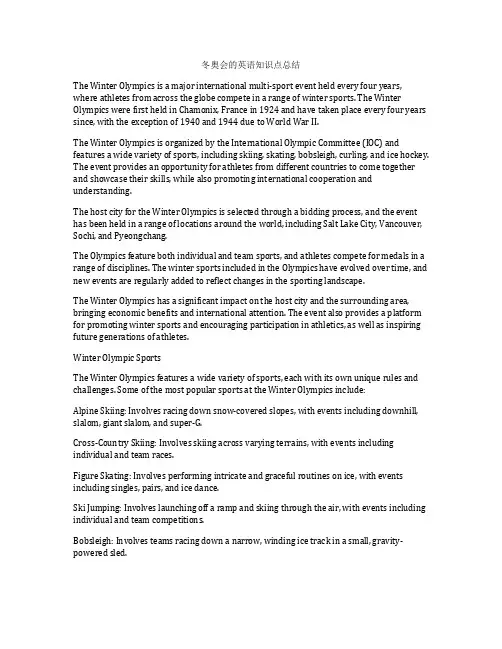
冬奥会的英语知识点总结The Winter Olympics is a major international multi-sport event held every four years, where athletes from across the globe compete in a range of winter sports. The Winter Olympics were first held in Chamonix, France in 1924 and have taken place every four years since, with the exception of 1940 and 1944 due to World War II.The Winter Olympics is organized by the International Olympic Committee (IOC) and features a wide variety of sports, including skiing, skating, bobsleigh, curling, and ice hockey. The event provides an opportunity for athletes from different countries to come together and showcase their skills, while also promoting international cooperation and understanding.The host city for the Winter Olympics is selected through a bidding process, and the event has been held in a range of locations around the world, including Salt Lake City, Vancouver, Sochi, and Pyeongchang.The Olympics feature both individual and team sports, and athletes compete for medals in a range of disciplines. The winter sports included in the Olympics have evolved over time, and new events are regularly added to reflect changes in the sporting landscape.The Winter Olympics has a significant impact on the host city and the surrounding area, bringing economic benefits and international attention. The event also provides a platform for promoting winter sports and encouraging participation in athletics, as well as inspiring future generations of athletes.Winter Olympic SportsThe Winter Olympics features a wide variety of sports, each with its own unique rules and challenges. Some of the most popular sports at the Winter Olympics include:Alpine Skiing: Involves racing down snow-covered slopes, with events including downhill, slalom, giant slalom, and super-G.Cross-Country Skiing: Involves skiing across varying terrains, with events including individual and team races.Figure Skating: Involves performing intricate and graceful routines on ice, with events including singles, pairs, and ice dance.Ski Jumping: Involves launching off a ramp and skiing through the air, with events including individual and team competitions.Bobsleigh: Involves teams racing down a narrow, winding ice track in a small, gravity-powered sled.Snowboarding: Involves racing down a slope on a snowboard, with events including halfpipe, slopestyle, and snowboard cross.Ice Hockey: Involves teams competing to score goals on a ice rink, with events for both men and women.Curling: Involves teams competing to slide stones across the ice and into a target area, with events for both men and women.The Winter Olympics also includes a range of other sports, such as biathlon, speed skating, luge, and skeleton. Each sport requires a high level of skill, athleticism, and dedication from the athletes, and the Winter Olympics provides an opportunity for them to showcase their abilities on the world stage.Host CitiesThe Winter Olympics is held in a different host city every four years, chosen through a bidding process by the International Olympic Committee. The host city plays a crucial role in the success of the event, providing the infrastructure and facilities needed to accommodate athletes, officials, and spectators.The host city is responsible for building and maintaining venues for the various sports, as well as providing accommodation, transportation, and security. The Winter Olympics can have a significant impact on the host city, bringing economic benefits, international attention, and a legacy of world-class athletic facilities.Some of the most iconic Winter Olympics host cities include:Chamonix, France: Hosted the first Winter Olympics in 1924, with events including skiing, skating, and ice hockey.Lake Placid, USA: Hosted the Winter Olympics in 1932 and 1980, with events including bobsleigh, figure skating, and ski jumping.Innsbruck, Austria: Hosted the Winter Olympics in 1964 and 1976, with events including alpine skiing, ski racing, and ice hockey.Lillehammer, Norway: Hosted the Winter Olympics in 1994, with events including cross-country skiing, speed skating, and biathlon.Salt Lake City, USA: Hosted the Winter Olympics in 2002, with events including snowboarding, freestyle skiing, and ice hockey.Vancouver, Canada: Hosted the Winter Olympics in 2010, with events including curling, ice dancing, and ski cross.Sochi, Russia: Hosted the Winter Olympics in 2014, with events including figure skating, snowboarding, and bobsleigh.Pyeongchang, South Korea: Hosted the Winter Olympics in 2018, with events including ski jumping, luge, and skeleton.Each host city brings its own unique culture, landscape, and sporting heritage to the Winter Olympics, providing a backdrop for athletes to compete and spectators to enjoy the festivities.Impact and LegacyThe Winter Olympics has a significant impact on the host city and the surrounding area, bringing economic benefits, international attention, and a legacy of world-class athletic facilities.Economic Benefits: The Winter Olympics can stimulate economic growth through increased tourism, infrastructure development, and job creation. The event brings in athletes, officials, and spectators from around the world, as well as media coverage and sponsorship opportunities.Infrastructure Development: The Winter Olympics requires the construction of venues for a wide range of sports, as well as accommodation, transportation, and security facilities. These new developments can provide long-term benefits to the host city, serving as a legacy for future generations.Community Engagement: The Winter Olympics provides an opportunity for the host city to engage with the local community and promote participation in winter sports. The event can inspire a new generation of athletes, coaches, and volunteers, as well as encouraging healthy and active lifestyles.International Profile: The Winter Olympics raises the international profile of the host city and the surrounding area, showcasing its culture, landscape, and sporting heritage to a global audience. The event can create a lasting legacy of positive associations with the host city.Overall, the Winter Olympics has a profound and lasting impact on the host city and the surrounding area, leaving a legacy of economic, social, and cultural benefits for years to come. The event brings together athletes, officials, and spectators from around the world, promoting international cooperation and understanding through the power of sport.ConclusionThe Winter Olympics is a major international multi-sport event that brings together athletes from across the globe to compete in a range of winter sports. The event is organized by the International Olympic Committee and features a wide variety of sports, with events for both individuals and teams.The Winter Olympics is held in a different host city every four years, chosen through a bidding process, and has a significant impact on the host city and the surrounding area. Theevent brings economic benefits, international attention, and a legacy of world-class athletic facilities, as well as promoting participation in winter sports and inspiring future generations of athletes.The Winter Olympics has a profound and lasting impact on the host city and the surrounding area, leaving a legacy of economic, social, and cultural benefits for years to come. The event brings together athletes, officials, and spectators from around the world, promoting international cooperation and understanding through the power of sport.。
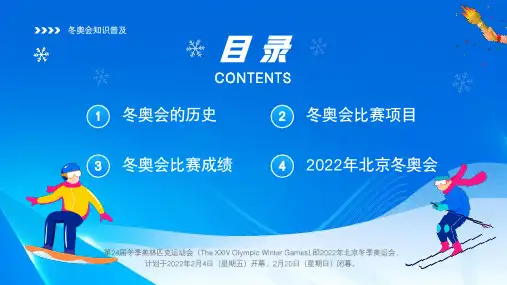
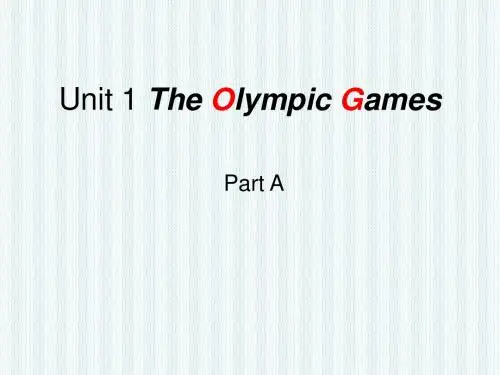
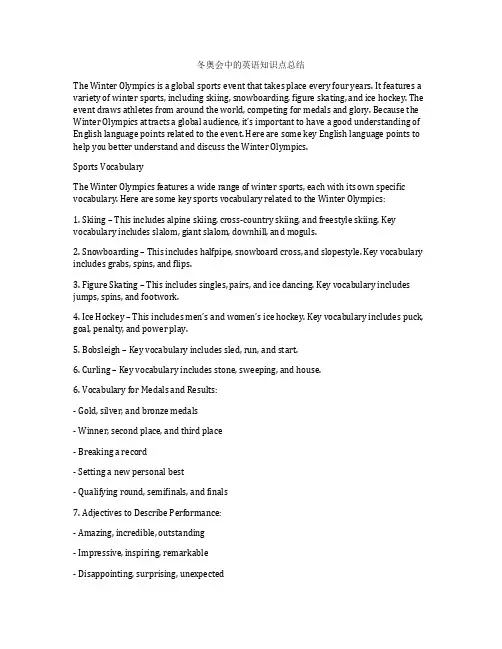
冬奥会中的英语知识点总结The Winter Olympics is a global sports event that takes place every four years. It features a variety of winter sports, including skiing, snowboarding, figure skating, and ice hockey. The event draws athletes from around the world, competing for medals and glory. Because the Winter Olympics attracts a global audience, it’s important to have a good understanding of English language points related to the event. Here are some key English language points to help you better understand and discuss the Winter Olympics.Sports VocabularyThe Winter Olympics features a wide range of winter sports, each with its own specific vocabulary. Here are some key sports vocabulary related to the Winter Olympics:1. Skiing – This includes alpine skiing, cross-country skiing, and freestyle skiing. Key vocabulary includes slalom, giant slalom, downhill, and moguls.2. Snowboarding – This includes halfpipe, snowboard cross, and slopestyle. Key vocabulary includes grabs, spins, and flips.3. Figure Skating – This includes singles, pairs, and ice dancing. Key vocabulary includes jumps, spins, and footwork.4. Ice Hockey –This includes men’s and women’s ice hockey. Key vocabulary includes puck, goal, penalty, and power play.5. Bobsleigh – Key vocabulary includes sled, run, and start.6. Curling – Key vocabulary includes stone, sweeping, and house.6. Vocabulary for Medals and Results:- Gold, silver, and bronze medals- Winner, second place, and third place- Breaking a record- Setting a new personal best- Qualifying round, semifinals, and finals7. Adjectives to Describe Performance:- Amazing, incredible, outstanding- Impressive, inspiring, remarkable- Disappointing, surprising, unexpected8. Expressions of Support and Encouragement:- Go for it!- You can do it!- Keep it up!- Well done!9. Describing Athletes and Performances:- Skilled, talented, experienced- Athletic, agile, graceful- Nervous, confident, determined10. The Language of Sports Commentary:- He/she is in the lead.- That was an amazing performance!- They're neck and neck.- It's a tight competition.11. Talking About the Venue:- The Olympic Village- The stadium- The slopes- The ice rink12. Discussing the Spirit of the Olympics:- Fair play- Friendly competition- Unity and camaraderie- Pursuit of excellence13. Talking About the Opening and Closing Ceremonies: - The lighting of the Olympic torch- Parade of nations- Cultural performances- The handing off of the Olympic flag14. Describing the Atmosphere:- Electric- Thrilling- Energetic- Jubilant15. Expressing National Pride:- Go Team USA!- Let's hear it for Canada!- Proud to be representing (your country)!- We’re all rooting for (your country)!Phrasal Verbs and Idioms:1. Give it your all – to put in a maximum effort2. Go for the gold – to aim for the highest achievement3. Come out on top – to be the winner4. Win by a nose – to win a competition by a very small margin5. Put your best foot forward – to do your best6. Up the ante – to increase the level of competition or effort7. Play second fiddle – to be in a subordinate position8. In the home stretch – nearing the end of a race or competition9. Have the upper hand – to have an advantage10. Behind the eight ball – in a difficult or unfavorable position Useful Phrases for Interactions:1. “Did you see that amazing performance?”2. “I can’t believe they broke the record!”3. “Who are you rooting for in the (sport) event?”4. “The competition is really heating up. It’s anyone’s game!”5. “I’m on the edge of my seat watching this competition!”6. “The level of skill and athleticism on display is truly impressive!”General Vocabulary:1. Competitor – a person taking part in a competition2. Contender – a person or team with a chance of winning3. Medalist – a person who has won a medal4. Athlete – a person who is proficient in sports and other forms of physical exercise5. Coach – a person who trains and directs athletes6. Spectator – a person who watches a sport or game7. Tournament – a competition involving a number of teams or individuals8. Venue – the place where an event takes place9. Adrenaline – a hormone released in the body in response to high excitement or stress10. Endurance – the ability to withstand hardship or adversityLanguage for Describing Performance:1. Stellar performance2. Flawless execution3. World-class skill4. Display of athleticism5. Remarkable technique6. Unprecedented achievementRemember, when discussing the Winter Olympics, it’s also important to consider cultural sensitivity and use appropriate language to show respect for all participants. Sports can bring people together and promote understanding and unity, so it’s vital to communicate in a way that reflects these values.The Winter Olympics provides a wealth of opportunities to practice and improve your English. By learning and using the English language points outlined above, you can better understand and engage with the event, and participate in discussions and interactions with others who share your enthusiasm for this global sports spectacle. So, whether you’re watching the competitions at home, discussing the event with friends, or visiting the host city, these language points will help you fully appreciate and enjoy the Winter Olympics. Good luck and enjoy the games!。

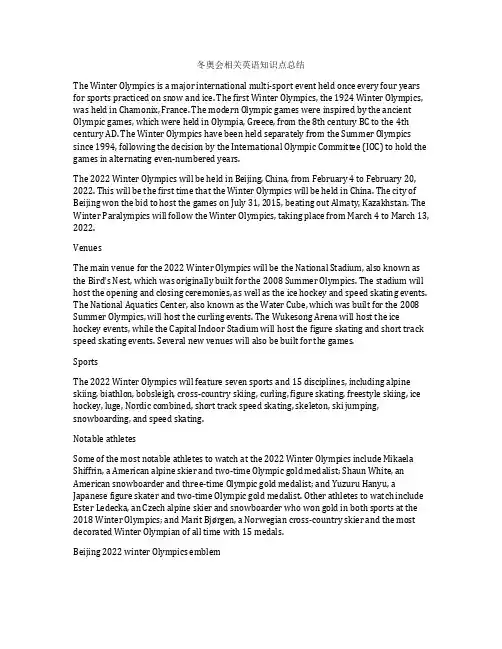
冬奥会相关英语知识点总结The Winter Olympics is a major international multi-sport event held once every four years for sports practiced on snow and ice. The first Winter Olympics, the 1924 Winter Olympics, was held in Chamonix, France. The modern Olympic games were inspired by the ancient Olympic games, which were held in Olympia, Greece, from the 8th century BC to the 4th century AD. The Winter Olympics have been held separately from the Summer Olympics since 1994, following the decision by the International Olympic Committee (IOC) to hold the games in alternating even-numbered years.The 2022 Winter Olympics will be held in Beijing, China, from February 4 to February 20, 2022. This will be the first time that the Winter Olympics will be held in China. The city of Beijing won the bid to host the games on July 31, 2015, beating out Almaty, Kazakhstan. The Winter Paralympics will follow the Winter Olympics, taking place from March 4 to March 13, 2022.VenuesThe main venue for the 2022 Winter Olympics will be the National Stadium, also known as the Bird's Nest, which was originally built for the 2008 Summer Olympics. The stadium will host the opening and closing ceremonies, as well as the ice hockey and speed skating events. The National Aquatics Center, also known as the Water Cube, which was built for the 2008 Summer Olympics, will host the curling events. The Wukesong Arena will host the ice hockey events, while the Capital Indoor Stadium will host the figure skating and short track speed skating events. Several new venues will also be built for the games.SportsThe 2022 Winter Olympics will feature seven sports and 15 disciplines, including alpine skiing, biathlon, bobsleigh, cross-country skiing, curling, figure skating, freestyle skiing, ice hockey, luge, Nordic combined, short track speed skating, skeleton, ski jumping, snowboarding, and speed skating.Notable athletesSome of the most notable athletes to watch at the 2022 Winter Olympics include Mikaela Shiffrin, a American alpine skier and two-time Olympic gold medalist; Shaun White, an American snowboarder and three-time Olympic gold medalist; and Yuzuru Hanyu, a Japanese figure skater and two-time Olympic gold medalist. Other athletes to watch include Ester Ledecka, an Czech alpine skier and snowboarder who won gold in both sports at the 2018 Winter Olympics; and Marit Bjørgen, a Norwegian cross-country skier and the most decorated Winter Olympian of all time with 15 medals.Beijing 2022 winter Olympics emblemThe emblem of the 2022 Winter Olympics is inspired by the Chinese character "冬" (dōng), which means winter. The emblem also resembles a skater, a skier, and the Chinese calligraphic art scroll. The emblem was unveiled on December 15, 2017, and represents a dynamic figure skater on a ribbon of ice.SustainabilityThe 2022 Winter Olympics will focus on sustainability and environmental protection, with the goal of creating a "Green Olympics." Several measures will be taken to reduce the environmental impact of the games, including using renewable energy, promoting low-carbon transportation, and implementing waste reduction and recycling programs. Additionally, the games will focus on promoting winter sports and increasing participation in winter sports in China and around the world.ConclusionThe 2022 Winter Olympics in Beijing will be a historic event for China and for the world. The games will showcase the best winter athletes from around the world, and will provide an opportunity to promote winter sports and the spirit of the Olympic movement. With a focus on sustainability and environmental protection, the 2022 Winter Olympics will leave a positive legacy for future generations.。
冬奥会知识小学英语短道速滑Short Track Speed Skating速度滑冰Speed Skating花样滑冰Figure Skating冰球Ice Hockey冰壶CurlingShort Track Speed Skating<br>短道速滑Short Track Speed Skating is an ice discipline. In competitions, multiple skaters (typically between four and six) skate on an oval ice track with a length of 111.12 meters. The ice rink has a minimum measurement of 60 meters ×30 meters.短道速滑是一个冰上运动项目。
在比赛中,多名运动员(通常为4-6人)在长为111.12米的椭圆形冰道上滑行。
冰面(冰场)最小尺寸为60米×30米。
Short Track Speed Skating was originated from Canada in 1905 when artificial indoor ice hockey rinks were built, which led many skaters to practice on ice rinks. In 1979 in Quebec City, Winnipeg andother cities in Canada started to hold mass indoor speed skating competitions on a short track.短道速滑在1905年起源于加拿大。
当时加拿大修建了室内冰球场,于是一些速度滑冰爱好者开始在室内冰球场地进行练习。